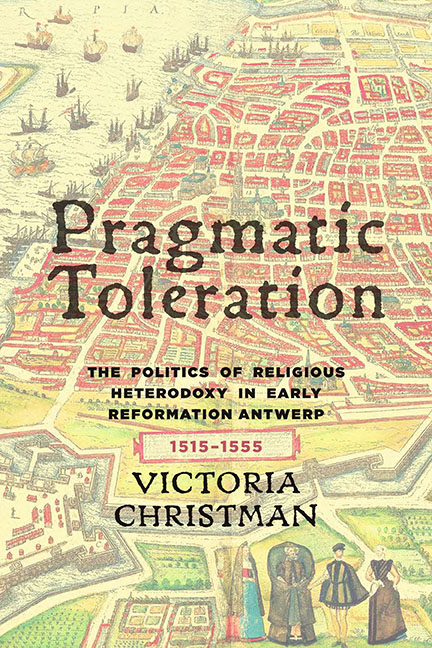Book contents
- Frontmatter
- Dedication
- Epigraph
- Contents
- Acknowledgments
- Introduction
- 1 The Lay of the Land: Government and Law in Brabant
- 2 Undercover: The Claes vander Elst Conventicle
- 3 Pragmatic Intolerance: Antwerp's Anabaptists
- 4 People of the Book: Heterodox Printers and Publishers in Antwerp
- 5 Between Stage and Scaffold: Rederijker Trials in Antwerp
- 6 Trade in Tolerance: The Portuguese New Christians in Antwerp, 1526–50
- Conclusion: Rulers and Religious Renegades
- Appendix 1 Chronology of Antiheresy Legislation in Brabant
- Appendix 2 Answers at Ghent
- Abbreviations
- Notes
- Bibliography
- Index
- Frontmatter
- Dedication
- Epigraph
- Contents
- Acknowledgments
- Introduction
- 1 The Lay of the Land: Government and Law in Brabant
- 2 Undercover: The Claes vander Elst Conventicle
- 3 Pragmatic Intolerance: Antwerp's Anabaptists
- 4 People of the Book: Heterodox Printers and Publishers in Antwerp
- 5 Between Stage and Scaffold: Rederijker Trials in Antwerp
- 6 Trade in Tolerance: The Portuguese New Christians in Antwerp, 1526–50
- Conclusion: Rulers and Religious Renegades
- Appendix 1 Chronology of Antiheresy Legislation in Brabant
- Appendix 2 Answers at Ghent
- Abbreviations
- Notes
- Bibliography
- Index
Summary
In 1543, the young Spanish humanist Francisco de Enzinas traveled from Wittenberg, in Saxony, where he had been staying with his friend Philip Melanchthon, to Antwerp in the Low Countries. In that city, one of the principal publishing centers in Europe, he had his newly translated Spanish New Testament printed, with an opening dedication to the Holy Roman Emperor, Charles V. Enzinas then made his way to Brussels, where he exploited his aristocratic connections to secure a private audience with the emperor himself, in order to present him with his freshly minted vernacular Bible. But Charles had recently issued a placard forbidding the publication of unauthorized religious texts, and introducing the possibility of capital punishment as a penalty for that crime. In light of this edict, Enzinas's actions appear irresponsibly bold. And indeed, he was duly arrested by imperial officials and incarcerated in Brussels to await trial. But after two years in prison he escaped from jail. He returned to the relative safe haven of Antwerp, where he remained for a month, traveling thereafter back to the security of the Germanic lands.
Enzinas's story, dramatically recounted in his autobiographical memoir, paints a vivid picture of the social and religious milieu of the early modern Low Countries. Against the background of Charles V's increasingly stringent religious legislation, the hubris with which Enzinas acted is startling, and can be understood only in light of the permissive religious atmosphere he encountered during his two short stays in Antwerp. In this sixteenth-century metropolis, replete with inhabitants from all corners of the world and from all religious persuasions, Enzinas was emboldened by what he experienced as the judicially lenient attitude of the municipal authorities. He even writes in his memoir that in the month following his jailbreak, he moved around Antwerp freely, walking the streets unmolested and seeking advice from the city's leaders, who knew who he was but did not arrest him or turn him in to their imperial overlords in Brussels. That Enzinas could exercise such liberty should be surprising, given that Antwerp was subject to the harsh religious laws promulgated by Charles V and his regents in the years immediately preceding his arrival, and even more so because Antwerp lies just thirty miles north of Brussels, then the seat of the Catholic imperial court.
- Type
- Chapter
- Information
- Pragmatic TolerationThe Politics of Religious Heterodoxy in Early Reformation Antwerp, 1515–1555, pp. 1 - 14Publisher: Boydell & BrewerPrint publication year: 2015



